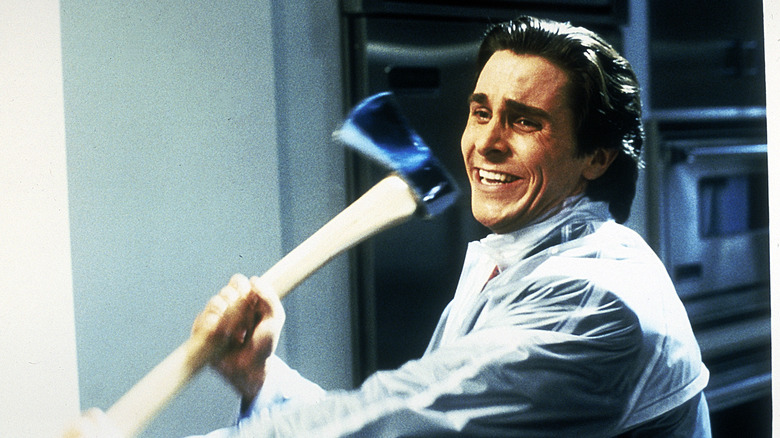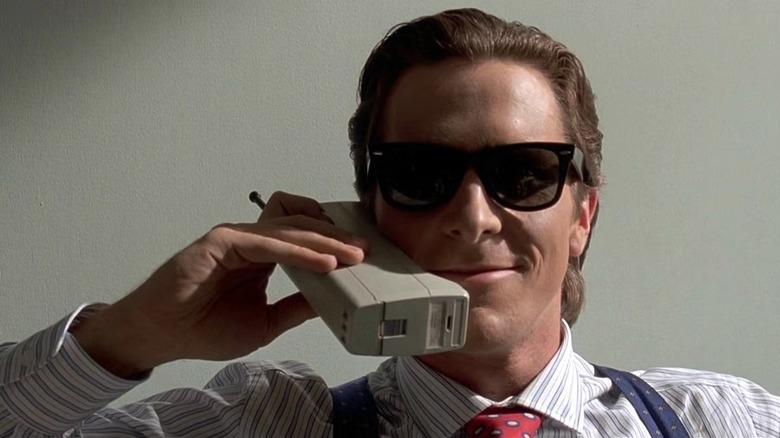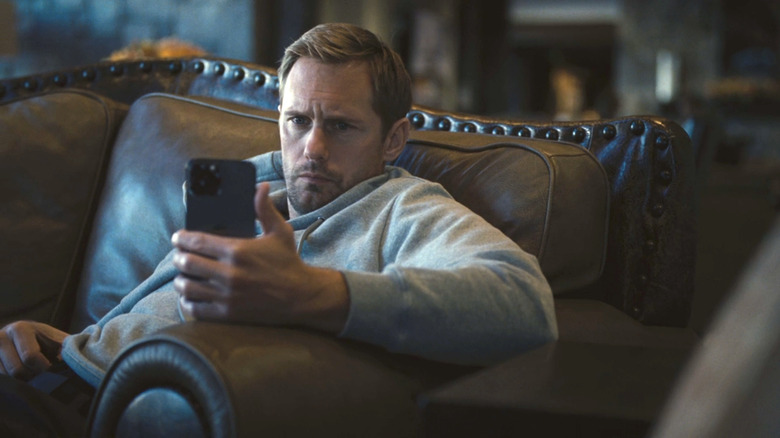Lionsgate Wants An American Psycho Remake, And It's Not Such A Terrible Idea
In 2016, 25 years after the publication of his novel "American Psycho," author Bret Easton Ellis wrote an article for Town & Country magazine reflecting on a question he was frequently asked: what would Patrick Bateman be doing now? In the mid-to-late '90s, Ellis thought that Bateman "would have been the founder of a number of dotcoms." Or, had the book been written in the decade leading up to 2016, "Bateman would have been working in Silicon Valley [...] palling around with Zuckerberg and dining at the French Laundry [...] wearing a Yeezy hoodie and teasing girls on Tinder."
The book is both very much of its time and also eerily prescient. It's easy to imagine Patrick Bateman as an influencer within TikTok's 'Hustle Culture,' working himself into a rage over other guys having more followers than him. As Ellis himself wrote:
"All the themes of the book still hold sway three decades later. We are in a time when the one percent are richer than any human has been before, an era when a jet is the new car and million-dollar rents are the reality. New York today is 'American Psycho' on steroids."
A recent report by The Insneider that Lionsgate is planning to make a modern-day reboot of "American Psycho," and is currently searching for a writer, had many fans of Mary Harron's 2000 adaptation voicing their objections. They have a point; Harron's film is a near-perfect adaptation of the book and an early contender for one of the best films of the 21st century. But a quarter of a century later, the world had changed enough to fuel a whole new "American Psycho."
Why people (rightfully) hate the idea of an American Psycho remake
Before defending the idea of an "American Psycho" remake, let's first drop in on the reasons why it sounds like a terrible idea. First of all, Lionsgate deciding to develop a remake and searching for a writer to tackle the script screams "hey, here's some valuable IP that we haven't monetized for a while!" It's quite a contrast to how the original movie was made.
Speaking to Vice for the film's 20th anniversary, Ellis recalled that the film adaptation was "very surprising" because the book didn't exactly fit with mainstream American cinema. "There was nobody in line asking to buy 'American Psycho' or option it, except for one producer, and that was Ed Pressman," said Ellis. Pressman was "obsessed" with turning the book into a movie and kept optioning the rights, year after year. Even Ellis' own agents thought nothing would ever come of it. Harron herself was "intrigued" by the novel, but had her doubts when she was eventually approached by the production company: "I wasn't sure if I could make a movie out of it, but I said, 'I'll write a script and I'll see.'"
The film was ultimately enough of a box office success to get a hasty cash-in sequel, "American Psycho II: All American Girl" — which is another reason why fans are right to be wary. The rushed follow-up took a script titled "The Girl Who Wouldn't Die," which had nothing to do with "American Psycho," and roughly shoehorned in a connection to Patrick Bateman. The results were not great and ultimately Lionsgate scrapped the planned theatrical release and sent the movie straight to video.
So, the studio doesn't exactly have a history of respecting the integrity of Ellis' novel or Harron's movie. Speaking to The Guardian in 2010, Ellis revealed that Lionsgate even mulled over giving "American Psycho" the "NCIS" treatment: "They were thinking about doing 'American Psycho In LA,' 'American Psycho In Las Vegas,' and making a whole franchise out of it."
The case for a new American Psycho
If there was one more argument to be made against a modern "American Psycho" movie, it might be that HBO's "Succession" has very recently spent four seasons plumbing the depths of dysfunction among the ultra-wealthy. From Roman Roy taunting a small boy with the hope of a million-dollar cheque to Lukas Matsson sending his comms director frozen bricks of his blood ("as a joke, obviously"), the show went to some fascinatingly repugnant places. There have also been plenty of great movies about the lack of empathy in the ultra-wealthy ("The Wolf of Wall Street" and "Parasite," to name just a couple). But where an "American Psycho" reboot would have an opportunity to plant a flag is by being the first truly great movie about psychopathy in the social media age.
Hollywood has so far struggled to meaningfully dig into the isolation of an always-online world. David Fincher's "The Social Network" is often held up as the best movie about social media, but it's more about the creation of Facebook than the website itself. Other films have effectively used the "screenlife" format to tell compelling stories through screens, but again, they haven't really gone under the surface. Bo Burnham's pandemic-induced special "Inside" has probably come closest to nailing the neuroses of a constantly connected society, but there's still plenty of earth to turn over.
With his rehearsed spiels about Phil Collins or his daily skincare routine, Patrick Bateman was practically tailor-made for the 2020s. It's an age where millions of hopefuls are performing for the camera every day, and only the most beautiful, accomplished, affluent, and aspirational influencers can emerge victorious in the battle for attention. It's an era when mental health apps are offering remote on-demand therapy so that psychological self-care can be as time-efficient as possible (and also so that the company can data-mine transcripts of therapy sessions). With the right creative team, a fresh take on "American Psycho" could be a laugh riot.


